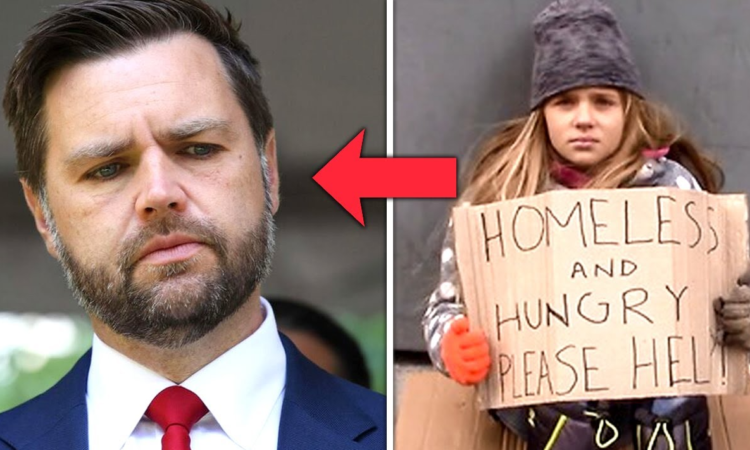
JD Vance thought it was just another dinner until a little girl’s quiet request for food pulled him into a moment that would change all their lives.
The air carried a sharp bite that night, the kind that sank through thin layers of fabric and settled deep in the bones. Outside Bill’s Diner, a small but busy spot in Cincinnati, Ohio, the sidewalk was lined with parked cars. Their windshields fogged from the contrast between the warm interiors and the cold outside.
Inside, the diner buzzed with movement. Waitresses balanced plates, silverware clinked, voices blended into a dull hum. It smelled of sizzling burgers, fresh coffee, and warm bread. But just beyond the glow of the windows, a little girl stood motionless near the entrance. She couldn’t have been more than ten. Her jacket was oversized and frayed, barely clinging to her thin frame. Her backpack straps were pulled tight, hands swallowed by sleeves. She wasn’t begging. She wasn’t calling for attention. She was just standing—watching, waiting.
The door opened and JD Vance stepped out. His breath curled in the air as he adjusted his coat, still carrying the warmth of the diner and the scent of coffee. A quiet dinner, a brief chat with an old friend, and now a short walk to his car.
Then he saw her.
She didn’t look at him. Her eyes were on the foam container in his hand—the leftover club sandwich and fries he hadn’t finished. He followed her gaze, then saw the way she instinctively licked her lips before catching herself. A lot of people would have walked away. JD didn’t.
He stepped toward her. She looked up. Her eyes were hungry, hesitant, and guarded.
“Sir,” she asked quietly, “do you have any food to spare?”
JD crouched down so they were eye level. “What’s your name?”
“Rebecca,” she whispered.
“Have you eaten today?”
She gave a tiny shrug. “Not really.”
JD glanced back at the diner. The open sign glowed red. He tightened his grip on the container. Then he said, “Come on. Let’s get you something fresh.”
She hesitated but followed. Inside, the warmth wrapped around them. He led her to a booth near the window.
“Whatever she wants,” JD told the waitress.
Rebecca paused. Ordering for herself was unfamiliar. After a moment, she said, “A burger. With fries. And chocolate milk.”
The waitress smiled. JD let her eat. She devoured half the burger before slowing. Then she looked at him.
“Why are you helping me?”
“Because you asked,” JD replied.
“Most people don’t.”
“Most people want to help. They just don’t know how.”
He asked where her parents were. She said her mom was at the shelter. She didn’t know where her dad was. It wasn’t always like this. Before her dad lost his job, they had a place. A bed. Then he left. Everything changed.
The burger was almost gone when JD asked, “Do you want me to take you back to your mom?”
Rebecca’s shoulders tensed. “If I go back too early, she’ll be mad. Because she’s tired. Because she’s sad. Because nothing gets better.”
The diner door opened. A woman stepped in—disheveled, searching. Her coat was too big. Her eyes found Rebecca.
“Where the hell have you been?”
It was her mom. Relief and frustration in her voice. JD stayed seated. The woman looked at him.
“Who are you?”
“Just someone who bought her dinner.”
“She shouldn’t be bothering people.”
“She wasn’t. She just asked.”
The woman slumped into the seat. JD gently offered help. A nonprofit that could support them—housing, jobs, childcare.
“You a politician or something?”
“Something like that.”
“I don’t need handouts. Just a chance.”
“Then let me help you get that chance.”
Before she could answer, a voice interrupted.
“Sir?”
A police officer. Behind him, a man with a badge—CPS.
“We got a call about a child in distress.”
“We’re fine,” the mother snapped.
“Are you a relative?” the CPS worker asked JD.
“No,” JD said calmly.
The tension grew. Rebecca clutched her mom’s sleeve.
JD stepped in. “They need help, not punishment. Unless you’re offering real solutions, I suggest you walk away.”
After a long silence, the CPS worker backed off. The officer nodded and followed.
JD sat down again. “This time can be different.”
Rebecca’s mom looked at him. She nodded.
JD handed her a card. “Call them. You won’t be forgotten.”
Rebecca asked quietly, “Will we have to sleep at the shelter again?”
“Maybe not,” her mom replied.
The waitress returned. “Your meals are covered. That man by the counter paid. And the owner said—if you come back tomorrow, breakfast is on the house.”
They were stunned. JD smiled. “Maybe someone just wanted to help.”
Rebecca’s mom laughed softly. “Guess I don’t have an excuse not to call, huh?”
JD walked them to the curb. Rebecca’s mom said, “I still don’t know why you did all this.”
“Because someone once did it for me.”
Rebecca asked, “Do you think they’ll really help us?”
“I think the hardest part is deciding you deserve the help.”
She pulled out her phone. She called. When she hung up, she looked at JD. “They said they’ll see us first thing in the morning.”
Rebecca smiled.
JD stepped toward his car.
“Wait,” Rebecca called. “Thank you.”
“You’re welcome.”
He drove off. The diner lights faded in the mirror. But he had a feeling this wasn’t the last time he’d hear about them.
Because sometimes, a single moment of kindness changes everything.




